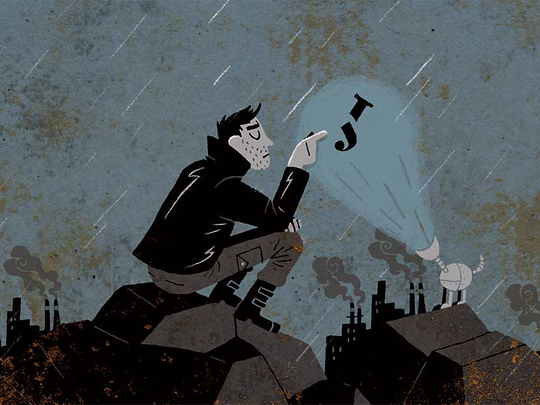
J
By Howard Jacobson, Jonathan Cape, 336 pages, $25
“First the serious books give way to footling books,” Howard Jacobson once warned in a column about libraries: “Then the books give way altogether to ... computers.”
Written in 2005, a year before the first Twitter message was published, Jacobson’s jeremiad on what he called “terminal triviality” seems almost innocent now. Yet with the arrival of his dystopian novel “J”, that use of “terminal” acquires a new, menacing edge.
Later this century in a vaguely recognisable Britain, a shadowy regime has groomed its citizens to blot out a horrific event that took place in the 2020s: a wave of bloodletting coordinated through social networking. The pogrom, against an unnamed ethnic group, is officially termed “what happened, if it happened”. In private, one character refers to it as “Twitternacht”.
Full of such quirks and coinages, “J” — shortlisted this week for the Man Booker Prize — centres on a pair of misfits who have attracted the regime’s attention. A native of fictitious Port Reuben, Kevern Cohen has been marked since childhood by fears of a knock at the door. He hoards a stash of semi-proscribed jazz CDs, yet follows his father’s habit of putting two fingers across his mouth when saying words containing the letter “j”.
Into Kevern’s life comes the younger Ailinn Solomons, brought up by nuns and curious about her roots. Is their meeting by accident or design? Behind the scenes a bureaucrat, Esme, valiantly seeks the truth about “what happened”, though perhaps not for benign ends. Meanwhile a university professor and regime informer named Everett pens silky reports on Kevern and Ailinn. Everett’s academic specialisms are “Benign Visual Arts” and “Credibility Fatigue”; the latter is intended for those struggling to follow the regime’s strictures, including that of insincerely apologising for everything.
Jacobson has always been good at suggesting shape by describing the void: a comical mishearing that makes us hear a character more sharply, or an empty dress evoking a dead woman. In “J” — despite hints that the persecution is anti-Semitic in nature — the word Jew is absent. The printed letter “j” in the sections relating to Kevern is doubly scored through. “What happened” is compelling because its circumstances are largely withheld.
At first it seems significant that Kevern and Ailinn have Jewish surnames, until it emerges that everyone else does too — thanks to the regime’s renaming programme which appended Jewish surnames to Celtic-style first names. Jacobson is ever alert to the comic possibilities of nomenclature. Port Reuben’s vicar is called Golvan Shlagman; Petroc Rothschild turns out to be a labrador.
There is little overt state violence; the wages of terminal trivialisation are more subtly hellish. Jokes, and jazz, or any kind of improvisation, are deemed antisocial. The population is condemned to a Dantean loop of jerky, involuntary behaviours, ignorant of the nuances of thought or love. Couples “snog”, then beat each other up, and then robotically say sorry. Only our heroes are exempt. One flaw of “J” is the central couple’s fondness for prolix, wearying analyses of their own relationship, making a gooseberry of the reader.
In many ways a better novel than the 2010 Man Booker-winning “The Finkler Question”, “J” could, arguably, also be its sequel. Nothing is deadlier in Jacobson’s work than disgust and rage, and just as the apparently mild-mannered Treslove of “The Finkler Question” succumbs to rage outside a Jewish museum, an equivalent scene occurs, in “J”, outside a Jewish art gallery.
In Finkler, Jewishness is linked to Treslove’s desire to resolve a lack in his life; in “J”, too, Jewishness, jazz and jokes are subtly associated with a kind of disrupting vitality without which art and life is so much white noise. Is such an ethnic association worryingly essentialist? What does the author himself think, or want us to think?
A novelist “isn’t here to have opinions”, Jacobson once declared: “Our job is to submit opinion to the comic drama of ambiguity and contradiction”. If so, “J” carries out that job — to the letter.
Financial Times









